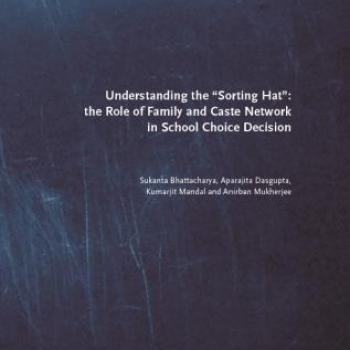Publication Information

Sorting of students over school type by their social standing creates the problem of social segregation and educational inequality. This paper, both theoretically and empirically, identifies factors which are responsible for sorting of students by socio-economic groups across different types of schools. We elaborate on the sorting mechanism by analyzing schools choice decisions where parents decide on the following: whether to send their children to private/public school and, conditional on that, whether to send them to a higher- or poorer- quality school. We find that household characteristics such as the number of siblings, caste identity affect these two choices differently. For example we find that general caste students are more likely to attend private school but within the private category they are more likely to end up in poorer quality schools. We develop our theory using a two period household level optimization framework and validate the prediction using Young Lives school survey data.

Sorting of students over school type by their social standing creates the problem of social segregation and educational inequality. This paper, both theoretically and empirically, identifies factors which are responsible for sorting of students by socio-economic groups across different types of schools. We elaborate on the sorting mechanism by analyzing schools choice decisions where parents decide on the following: whether to send their children to private/public school and, conditional on that, whether to send them to a higher- or poorer- quality school. We find that household characteristics such as the number of siblings, caste identity affect these two choices differently. For example we find that general caste students are more likely to attend private school but within the private category they are more likely to end up in poorer quality schools. We develop our theory using a two period household level optimization framework and validate the prediction using Young Lives school survey data.

